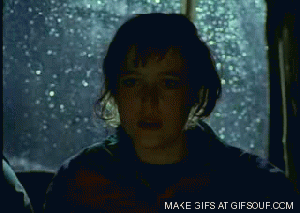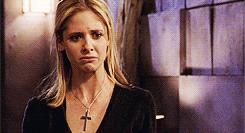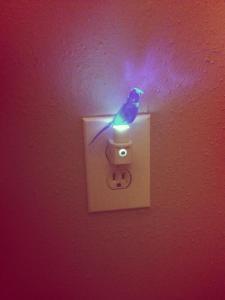On Writing and Chronic Illness — PART ONE: Confessional
I’m up late tonight because I found some cockroaches in my kitchen and I’m afraid to turn off the light. Fortunately, for Christmas, my grandmother got me a Blue Canary night light (think They Might Be Giants), but, bless that canary’s heart, it’s not enough to ward off that gross IS THERE A BUG CRAWLING ON ME feeling. Or, you know, actual bugs. It’s like the reverse of that X-Files episode, with the giant bug monster that “hides in the light” and the zombie people. Except roaches hide in the dark. And then there’s the X-Files episode with the mechanical cockroaches that eat people…
OR THIS EPISODE OH GOD:

Please bugs do not touch me.
Anyway. I digress. As usual. This post isn’t about The X-Files. It’s about health.
So. Let us ignore the fact that I live in an apartment complex that seems to be a little bit lax on the pest control (I swear, my kitchen is clean!) which is leading to the kind of panic that most people reserve for hearing gunshots in their neighborhood but will most certainly keep me up wee into the hours of tomorrow…and let’s focus on something that I want to talk about that is, believe it or not, loosely (not so loosely) connected to the frigging bugs. And something I’m seeing a lot of talk about lately. A lot of important talk. On the blogs of so many writers, I’m seeing discussions about health, invisible illness, and mental health. These are writers who are close, dear friends of mine, as well as writers whom I admire from afar (and/or stalk on Twitter SORRY NOT SORRY). And then there’s the tragic loss of a colleague last month, which is still causing ripples in our giant but oh-so-close-knit kidlit community. There is a light shining here into the darker parts of ourselves and, as scary as it is, we need to keep that light on.
I’ve talked before about suffering from bipolar disorder. I don’t talk about my specific diagnoses a lot, because it’s mostly irrelevant to y’all…and irrelevant in general, since I believe in treating symptoms rather than labels, but I have Bipolar Type NOS (not otherwise specified) which basically means (and I’m not a doctor, here, so I’m just going to sum things up as best I can, don’t take my word for gospel) that I don’t fit the Type I or Type II profile. I’m mostly depressive with some mixed episodes (where I feel both manic and depressed, as well as agitated), and sometimes I experience episodes of hypomania, which mostly present as bursts of energy and productivity. As an extra bonus, there’s this: Have you ever seen those uber-lame “depression hurts” pharmaceutical ads? Yes, my symptoms present very physically as well as psychologically, especially when it comes to back, muscle, and joint pain and general fatigue. I also have panic disorder and issues with anxiety and probably a lot of other things if you give me enough time on Web MD. (Don’t let me on Web MD. I’m also a hypochondriac.) But, um, digressing again.

At least I don’t have Ghost Sickness.
Anyway, for some reason, my condition has been brought up with new acquaintances quite a bit recently, and I’ve gotten such strange, mixed responses. Everything from folks not even having heard of bipolar, to things like “oh, does that mean you have a hard time with stress?” or “does that mean you have multiple personalities?” or “are you violent?” often followed by even more invasive questions like “what are you like when you’re depressed?” which cannot be answered in a simple statement. (I never thought of this question as invasive until it was asked of me. I’m so open. And, yet, there it was, invading my space like a close-talker on Seinfeld.)
What am I like when I’m depressed? I’m sad. Like, bottom-dropping-out-sad. I’m unproductive. I’m sad about being unproductive. I’m angry. So angry. I’m self-defeating. I call people who understand and talk to them. I call people who don’t understand and fight with them. I pretend I’m going to get work done and take my laptop to my pretend-desk-that-is-actually-my-dining-room-table, only to spend an hour staring at things, feeling tired and achy and upset…and so I take the laptop back into my bedroom and lay down and try to eke out some writing or answer emails or just chat with friends while I marathon some show on Netflix and try to remind myself that I’m not lazy, I’m sick. I stare at the wall or the ceiling for way too long before realizing I’ve just been staring for, like, ever. I watch horror movies. Horror movies don’t give me “the feels.” I cry in the shower. I cry not in the shower. I have an impossible time deciding what to watch, wear, listen to, eat, drink, say, do, be. These are decisions that are too hard to make and I have to make them and it stresses me out. I get out of the shower and face plant onto my bed, still wrapped in a towel, talking to myself until I can convince myself that I should probably put on clothes, actual clothes, not the smelly pair of jeans that I keep “forgetting” to wash. (Reality: laundry is hard and I don’t want to/can’t do it.) I forget to eat. When I remember to eat I eat the first thing I can get my hands on and it’s usually junk food because real food is effort. Drying my hair is the most gargantuan task you could ask of me. I try to do it anyway. I put on make-up so that I can trick myself into thinking I’m a productive adult (sometimes it works). I skip putting on make-up because I’m not going to see any humans today so why bother except, wait, I have to pick up mail from the leasing office so maybe just mascara so I don’t feel like a moron. I call myself a moron. An idiot. A fatty. A loser. An asshole. A fuck-up. Useless. Lazy. Horrible. Lame. Stupid. Worthless.

Buffy has bad days, too. Really bad days.
And when I’m depressed, I know I’m depressed. And I don’t know yet if that’s a blessing or a curse. I’ve told friends who have approached me about their own struggles that once you figure out the cycle, and the signs, you can start to talk yourself through it. You can say this won’t last. You got past it last time and the time before that. And it doesn’t matter if it’s a horrible break-up or a broken nail that triggered this bout, there’s a light at the end of the tunnel and it doesn’t matter if you believe that it’s God or the universe or sheer force of will that will get you through, you have to believe and you WILL believe because you have the proof of your past experiences that this light is there.
Sometimes that’s not enough. Sometimes you just have to cry and yell at someone on the other end of the phone who isn’t getting it during your dark night of the soul. Sometimes you have to watch the scariest movie on Netflix alone in the dark and let yourself be numb to the fact that the kid on screen is possessed by demons. Sometimes you have to take a pill to help you deal with the fact that you have a (robot?) cockroach invasion in your kitchen because your life isn’t as glamourous as you want everyone to think and you live in the crappiest apartment you can stand in order to stretch every dollar possible and oh God you hate roaches more than even spiders. And sometimes you have to say to yourself over and over You’re okay you’re okay you’re okay.

Blue canary in the outlet by the light switch who watches over you…
And that’s okay. It’s not weak. I have to remind myself of this, sometimes daily. It’s not weak to be sick. It’s not weak to cry or scream or call a friend. It’s not weak to say no to a party or a date or a lunch because you’re not feeling so hot and you know yourself well enough to know that you need a day by yourself. It’s strong to know yourself. It’s strong to push limits at some times and wrap yourself in the edges of those limits at others. And, yes, I think there is strength, to a certain degree, in succumbing to your illness sometimes, to feel hopeless and helpless and wish you had a whole army of blue canary night lights to keep the roaches and the negatives self-talk and the people who don’t get it and the stereotypes and the debilitating lack of energy from penetrating your bubble of safety. Sometimes you need to just feel that in order to remember how to feel. Or in order to move on. I mean, I’d say there’s something to be said for the bottling it up method, but that method can die in a fire and I’m happy to light the match.
Which is why I wanted to post this. I wanted to post something. As I’m up late, talking to my friend and critique partner Amber Beilharz, who often writes about suffering from chronic illness, I realize how much power we have in each other. In our friendships. In a community that shares these things. I’m not a pioneer. Amber is not a pioneer. The writers who have blogged about their chronic conditions before me? Probably not pioneers. But if we can share these things with each other both privately and, given some boundaries, on the web, there’s so much we can do for each other. There are wonderful blog posts out there — ones which most of you reading this post have probably already read — such as The Spoon Theory from butyoudontlooksick.com, and a new favorite of mine, Allie Brosh of Hyperbole and a Half’s Depression Parts 1 & 2. (I have been using the phrase, “Basically, my base-self is angry-face-hoodie-sliding-off-the-couch, and I fight through that every day to be the person you know and love” to articulate to non-sufferers what it’s like to overcome what those illustrations so viscerally, well, illustrate.) I also highly recommend an older post from Sarah Ockler called “Just Make the Bed,” which, Sarah, if you’re reading, I have to thank you for, because just making the bed has been helping me for the last six months or so, in a very non-metaphorical way!
I also want to send love to authors like Cheryl Rainfield, J.K. Rowling, and Heather Brewer (AND SO MANY OTHERS, especially my friends (you DTMers are all my friends now, sorry…not sorry) who have contributed to Dear Teen Me over the years) who have used their experiences in conjunction with their platforms as writers and public figures with young audiences to help destroy stigma, encourage sufferers to get help, and to be a positive part both the arts community and the community of adults offering support to those who need it. It’s so. Damn. Important.
And maybe next time when someone asks “What are you like when you’re depressed?” I can just say, well, I’m me. And if we get to be friends, you’ll get to see that me, too. She’s not half-bad, no matter what she thinks.
COMING UP NEXT, IF THE ROBOT ALIEN ROACHES DON’T EAT ME IN MY SLEEP:
ON WRITING AND CHRONIC ILLNESS PART II: The actual part about writing.









